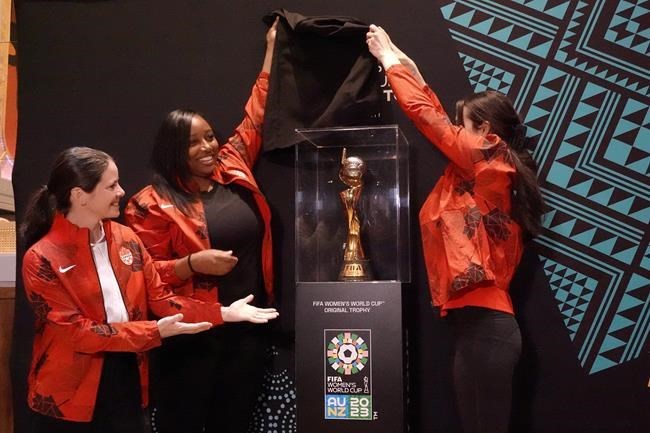TORONTO — Sarah Gandoin has been to 81 countries and is welcome wherever she goes.
Gandoin, from France, is FIFA's senior trophy tour manager, which means she travels with some shiny carry-on luggage. On Wednesday, she was watching over the FIFA's Women' World Cup trophy as it was showcased in Toronto.
"It's amazing, the way it's received everywhere in the world," she said of travelling with the trophy. "People are so excited."
Judging from the selfies taken beside the glass-encased trophy Wednesday, Canada is no different.
The golden trophy is making the rounds, visiting all 32 competing countries ahead of this summer's World Cup in Australia and New Zealand.
Its journey, which started Feb. 25 in Tokyo, will eventually take it Down Under in early June to tour the nine venues in co-hosts Australia and New Zealand.
It has already been to Japan, South Korea, the Philippines, Vietnam, China, Morocco, South Africa, Zambia, Nigeria, Brazil, Argentina, Colombia, Costa Rica, Panama, the U.S., Haiti and Jamaica.
So how does the trophy travel?
"Not in cargo. Ever," said Gandoin, seemingly shocked at the idea. "It's with us at all times, of course."
After a quick stop back at their Zurich home, Gandoin and the trophy will be on back on the road for stops in Germany, Denmark, Sweden, Norway, Ireland, England, Italy, the Netherlands, France, Spain and Portugal before heading to New Zealand and Australia.
Gandoin, who is on her fourth trophy tour, also looks after the men's trophy when it travels. But the hardware is only on the move at certain times — Gandoin says the women's trophy is only on show at the World Cup draw, the pre-tournament tour and the World Cup's opening match and closing ceremony.
Those on hand Wednesday at downtown restaurant included Australian High Commissioner Scott Ryan, New Zealand High Commissioner Martin Harvey, former Canadian internationals Diana Matheson, Robyn Gayle and Jonelle Filigno and Canada Soccer general secretary Earl Cochrane and president Charmaine Crooks.
Ryan says Australia can't wait for the opening kickoff of the women's soccer showcase.
"It's a sport that in Australia has seen an explosion in growth, particularly with women over the last 10 years," he said. "And it's a real opportunity for Australia and New Zealand to showcase what we can do as a major events host."
The World Cup runs July 20 to Aug. 20 with the sixth-ranked Canadian women playing their group games in Australia with two matches in Melbourne and one in Perth. Canada is in Group B with No. 10 Australia, No. 22 Ireland and No. 42 Nigeria.
"It really is around the corner," Cochrane said of the tournament, which Canada hosted in 2015.
For Cochrane, who has had to answer questions about the ongoing labour dispute with the men's and women's teams in recent months, the trophy visit was also a welcome return to soccer.
"It's great to focus on why we all do this," he said. "To see players like Diana, Robyn, Jonelle, to see them knowing that there are little girls, little boys, who are going to watch this event and dream about being those players, it makes you realize all the work that you do and all the significant time and effort that goes into it is all worthwhile."
Cochrane did not escape labour questions on the day, however. He says the talks are nearing resolution.
"We continue to have great dialogue with both teams. As we've said before, we're not really wanting to have these discussions in public. We'd rather have them in private. But there's some meaningful things being planned. I would say that in the next coming weeks, we hope to at least take steps towards getting things finalized and progress being made."
Canada's best finish at the World Cup was a fourth in 2003. In 2019, the Canadian women exited in the round of 16 after a 1-0 loss to Sweden.
The women's trophy has history off the field as well on it.
FIFA commissioned Angelo Brogioli to make the original trophy — and had him make two identical copies.
Norway won the trophy in 1995 and put it on display in the offices of the Norwegian football association. But FIFA says the trophy disappeared in 1997 during the renovation of the Ullevaal stadium in Oslo where the association is based.
It has never been found.
The 1999 finals in the U.S. were rebranded as a World Cup — the first two tournaments were officially known as the FIFA World Championship for Women's Football — complete with a new World Cup trophy.
The current trophy, designed by William Sawaya of the Milan firm Sawaya and Moroni, weighs 4.6 kilograms and stands 47 centimetres tall. It is made from gold-plated brass with a base made from candeias granite.
As with the men's trophy, underneath there is a gold disk which lists the winners.
The other original trophy is regularly on display in the FIFA World Football Museum in Zurich.
---
Follow @NeilMDavidson on Twitter
This report by The Canadian Press was first published April 19, 2023
Neil Davidson, The Canadian Press

